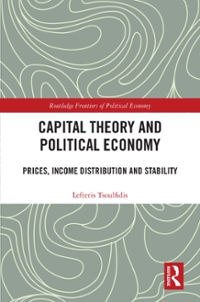Question
Read the following article and the question prompts. In the Apple App Store, Easy Entry Makes the Long Run Pretty Short One reason for the
Read the following article and the question prompts.
In the Apple App Store, Easy Entry Makes the Long Run Pretty Short
One reason for the popularity of Apple's iPhones and iPads is the section of Apple's iTunes music and video store devoted to applications (or "apps"). By 2017, sales of apps on iTunes approached $30 billion. Major software companies, as well as individuals writing their first software programs, have posted games, calendars, dictionaries, and many other types of apps to the App Store, for which they receive 30 percent of the revenue their app generates.
But competition in the App Store is intense, particularly for games, with about 750 new games being added to the store per day. Hogrocket, a three-person company, developed the game "Tiny Invaders" and began selling it in the App Store in 2011. Initially, the company was successful in selling the app for $2.99. As we have seen, though, when firms earn an economic profit in a market, other firms have a strong economic incentive to enter that market. Competition from new games forced Hogrocket to lower the price of its game to $0.99. At that price, the company was unable to sell enough downloads to break even, and the firm had to shut down.
With so many games to choose from, many people are unwilling to download one unless they can do so for free. Some app designers have tried the strategy of allowing apps to be downloaded for free while attempting to earn revenue by forcing users to see advertisements before the app opens or while it runs. Many people find these advertisements annoying, though, so developers have begun offering free apps that lack advertisements but where the developers earn revenue from users making in-app purchases. For instance, in the popular game "Candy Crush Saga," users are given free turns. After they have used them up, they can wait 30 minutes for another free turn or they can pay a small amount to immediately receive five more turns. Still, only about 3 percent of people who play these games make any in-app purchases. That leaves developers dependent on "whales," who make $50 to $100 per month in in-app game purchases. Only the best games can attract whale players and survive the intense competition of the App Store.
But even the most popular games eventually find their profitability undermined by competition. For instance, in Supercell's "Clash of Clans" game, players can slowly build up their villages' defenses and their armies for free or they can make an in-app purchase of "gems" to speed up the process. By 2017, Supercell's revenues from in-app purchases had begun to decline, which an article in the Wall Street Journal attributed to "fierce competition in the mobile gaming industry." Supercell also was suffering revenue declines from "Clash Royale," its follow-up game to "Clash of Clans." Other firms, including Rovio (maker of "Angry Birds") and Nintendo (maker of "Super Mario Run"), also experienced disappointing revenues from their mobile games. In a competitive market, earning an economic profit in the long run is extremely difficult. And the ease of entering the market for smartphone and tablet apps has made the long run pretty short.
Sources: Dan Gallagher, "Why Super Mario's Run Was Short," Wall Street Journal, January 2, 2017; Matthias Verbergt, "'Clash of Clans' Maker Posts Revenue Fall amid Pokmon Competition," Wall Street Journal, February 15, 2017; Adam Satariano, "Angry Birds Maker Rovio May Cut Jobs in Revamp of Functions," bloomberg.com, February 15, 2017; and Sarah E. Needleman, "Mobile-Game Makers Try to Catch More 'Whales' Who Pay for Free Games," Wall Street Journal, May 10, 2015.
Questions to think about:
- Why the competition in the cellphone apps market is so intense?
- Does such intense competition in the market for cellphone apps is beneficial for consumers and the society? If so little profit can be made, will this deter app developers from developing new apps?
- Besides in-app purchases and forcing app users to watch advertisements, what other strategies can app developers use to make profits?
- Can you think of some strategies to induce customers to pay for downloading apps?
- Should the government do something to regulate the market? Should the government make the competition in the market less intense? How can the government help app developers given that the profit can be made is so little?
Step by Step Solution
There are 3 Steps involved in it
Step: 1

Get Instant Access to Expert-Tailored Solutions
See step-by-step solutions with expert insights and AI powered tools for academic success
Step: 2

Step: 3

Ace Your Homework with AI
Get the answers you need in no time with our AI-driven, step-by-step assistance
Get Started


